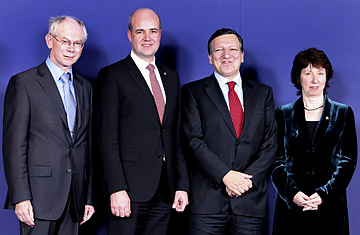
Newly appointed European Union President Herman Van Rompuy, left, poses with the newly appointed E.U.'s new foreign policy chief Catherine Ashton, right, European Commission President Jose Manuel Barroso, second right, and Swedish Prime Minister Fredrik Reinfeldt at the European Council building in Brussels, Thursday, Nov. 19, 2009.
Until Herman Van Rompuy became Belgium's Prime Minister 11 months ago, he was barely known even in his home country. But on Thursday night, the self-effacing former economist, whose hobbies include caravanning and writing haiku, was named the European Union's first permanent President.
Similarly, until she was appointed Britain's European Commissioner last year, only hardened London politicos were familiar with Baroness Catherine Ashton's name. But she is now the E.U.'s Foreign Minister-designate, with the unwieldy title of High Representative for Foreign Affairs and Security Policy.
The duo may yet become household names, but today, most Europeans will be scratching their heads at the decision by the E.U.'s 27 leaders to anoint Van Rompuy and Ashton to the organization's top two jobs. After all, the positions, which were created by the E.U.'s newly ratified Lisbon Treaty, were supposed to give a voice and a face to Europe on the world stage.
The choice prompted accusations that the E.U. had gone for the lowest common denominator. Van Rompuy was "bland" and Aston "unremarkable," said Daniel Cohn-Bendit, a German Member of the European Parliament who heads the Green group in that body. "E.U. leaders have continued the job of weakening the E.U. institutions," he said. "Europe is sinking to a low."
Van Rompuy recognized that the wider European public sees him as an unknown quantity, and he addressed it head-on after the summit. "There has been a great deal of talk and comment about the future profile and image of the President of the Council," he said. "But the key things are dialogue, unity and action: the image of the Council resides in strength through results."
Van Rompuy's career has been mainly that of a behind-the-scenes fixer in Belgian politics. And he emphasized that his position was not that of chief executive but, as President of the European Council, the body that gathers the E.U.'s leaders for summits, he is more of a chairman, whose role is to mediate across the E.U. "My personal opinion is totally subservient to the Council," he said. "It doesn't matter what I think. My role is to find a consensus."
Indeed, his shunning of the limelight is probably what landed him the job. Although he is recognized in Belgium for defusing tensions between the country's Flemish and French speakers — a quality that could come in handy with the 27-member E.U. — his low profile appears to have endeared him to his initial sponsors, German Chancellor Angela Merkel and French President Nicolas Sarkozy. The two leaders are thought to have balked at a big name like former British Prime Minister Tony Blair as E.U. President, because they feared he could become a strong rival for the spotlight. Van Rompuy, by contrast, might have lightweight political credentials, but he was seen as the least aggressive candidate.
There was more to the choice of Van Rompuy and Ashton than their individual qualities. In the classic European tradition of horse-trading, the E.U. tried to balance out the top jobs according to political background, geography and gender. Indeed, the Lisbon Treaty states that the two jobs — and that of the European Commission President — have to take account of "the geographical and demographic diversity of the Union."
Van Rompuy is a Christian Democrat, from the family of center-right parties that dominate European governments and the European Parliament. The President of the Commission, Portugal's José Manuel Barroso, is also from the center right. Ashton was a dark horse, but she was seen as a consolation prize for Britain's center-left Prime Minister Gordon Brown, after his attempt to secure the presidency for Blair was rebuffed. For E.U. leaders struggling to meet the criteria — a task that one official likened to "three-dimensional chess" — they could at least claim that the Van Rompuy-Ashton duo hit most of their buttons.
But Ashton roundly rejected claims that she had been catapulted from obscurity to meet the E.U.'s demands for a token, center-left woman. "Am I an ego on legs? No, I'm not," she said. "Judge me on what I do, and I think you'll be proud of me."
Nonetheless, the choice of Van Rompuy and Ashton was seen as exposing the gap between the E.U.'s ambition and its grandiose rhetoric. "They might both be very capable, but neither has any sort of international profile or experience," says Marco Incerti, Head of Communications at the Center for European Policy Studies (CEPS), a Brussels-based think tank. "At the moment, it looks like two nobodies. But this is what comes of trying to please everyone when you choose these jobs."
